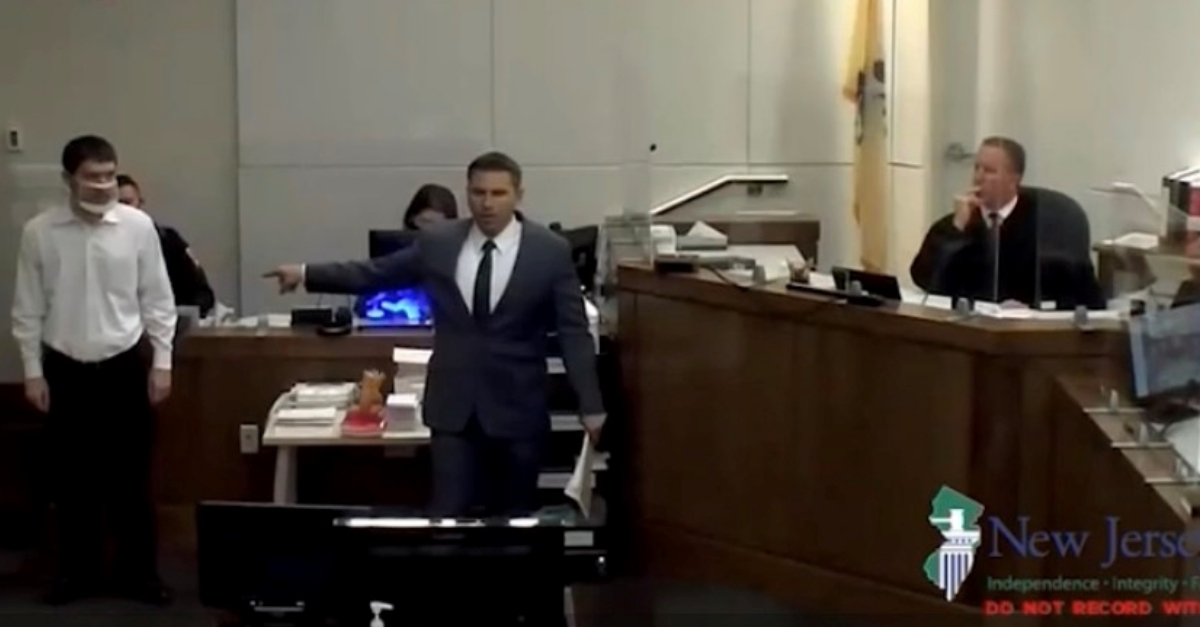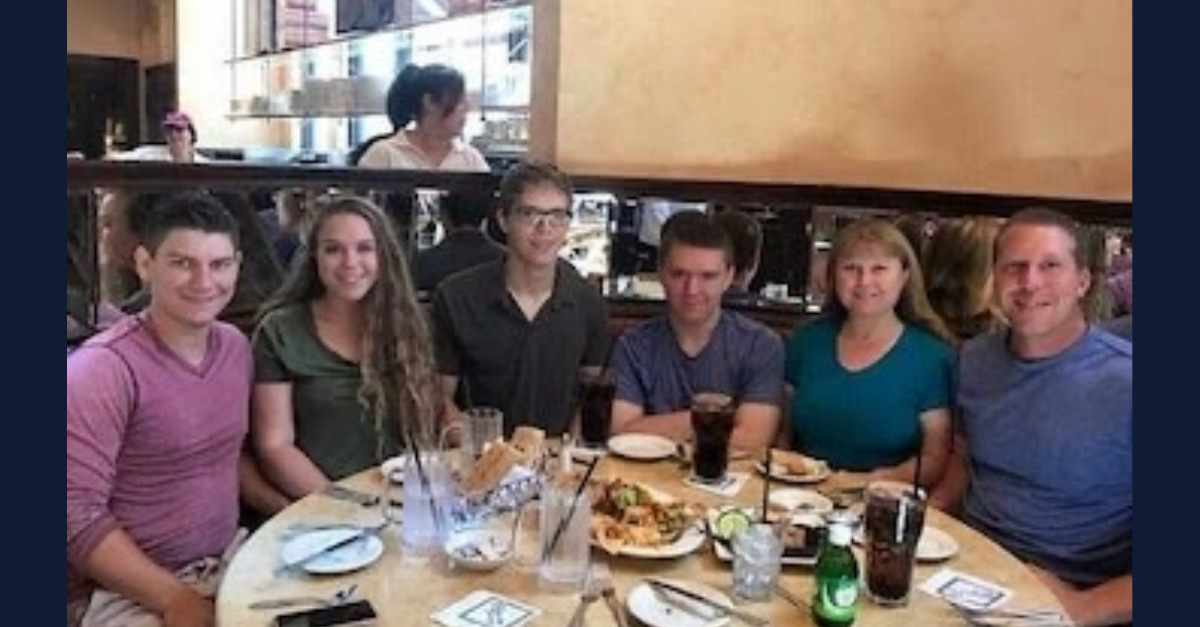
Scott Kologi (left) appears in court with defense attorney Richard Lomurro (center) and Monmouth County Superior Court Judge Marc C. Lemieux (right). (Image via video screengrab.)
A jury took just under five hours to convict a New Jersey man on trial for the murders of three family members and a close family friend.
Scott Kologi, 20, sat in silence as he listened to the verdict in a Monmouth County courtroom on Thursday, the Asbury Park Press reported. In the end, jurors found the defendant guilty of four counts of first-degree murder and a second-degree weapons charge for the deaths of his mother, father, sister, and surrogate grandmother on New Year’s Eve in 2017.
Kologi faces the possibility of four life sentences in prison for the deaths of Linda Kologi, 44; Steven Kologi Sr., 42; Mary Schulz, 70; and Brittany Kologi, 18. His sentencing is set for June 30.
The defense entered a plea of not guilty by reason of insanity and argued in court that Kologi had untreated schizophrenia and hallucinations and experienced a psychotic break the day of the murders. Kologi also suffered from severe developmental disabilities, his lawyer argued in court.
The defense called one of Kologi’s surviving brothers to the stand to support its claims during the second week of the three-week trial. Jonathan Ruiz testified that at the time of the shootings his brother still believed in Santa Claus, slept in his parents’ bed, and could not get dressed by himself, as first reported by Asbury Park Press.
A prosecution expert countered that the defendant “is autistic, not schizophrenic, and knew what he was doing when he killed his family members,” the Press said.
Kologi was 16 when a jury agreed that he killed his family, but prosecutors decided to try him as an adult.
A judge agreed to admit a video recording of the defendant’s alleged confession into evidence; the recording became a key piece of evidence for the state despite the defense’s attempts to block the tape.
Monmouth County Superior Court Judge Marc C. Lemieux ruled against defense attempts to block the jury from seeing the recording. The defense unsuccessfully argued in court filings that the defendant — a 16-year-old with autism — did not have the capacity to understand and then waive his Miranda rights.
Kologi’s lawyers also stated in those filings that Steven Kologi Jr. should never have been allowed to serve as his defendant brother’s guardian during police questioning since he was both present for the shootings and was the owner of the gun used to carry out the attack.
In the video, which was recorded just hours after the massacre and subsequently obtained by Law&Crime, Scott Kologi told a detective with the Long Branch Police Department how he carried out the killings. His brother struggled to maintain his composure while sitting in the room. The defendant then told a second detective with the Office of the Monmouth County Prosecutor that he was aware of his actions at the time.
Jurors heard that recording during the trial, including the two minutes Kologi spent describing how he killed his family. In the transcript below, “Detective 1” is Long Branch Detective Michael Verdadeiro, and “Detective 2” is Detective Andrea Tozzi of the Monmouth County Prosecutor’s Office.
KOLOGI: I know they’re all, well, deceased.
DETECTIVE 1: How do you know that?
KOLOGI: Like I said like even though like it felt like I wasn’t doing this physically, I was still able to see everything and I would like see them moving and I just kept firing until like they stopped moving. You know like aim at the head and whatnot.
DETECTIVE 1: So you’re aiming at their head?
KOLOGI: Yeah, and when I saw they’re still moving — because, like, even though I was like in this like type of thing like I just didn’t want to be in pain at the same time.
DETECTIVE 1: Alright, so let me rewind a little bit. So upstairs, your mom walks in, right?
KOLOGI: Well, opens the door to walk in.
DETECTIVE 1: So the gun is loaded already.
KOLOGI: Yes.
DETECTIVE 1: How many times do you shoot her?
KOLOGI: I would say five, seven times.
DETECTIVE 1: Where do you shoot her? At what part of the body?
KOLOGI: Like the torso and chest.
DETECTIVE 1: Alright, and then your father hears the shots and he comes up.
KOLOGI: Yes.
DETECTIVE 1: And then he’s hit, it was his back?
KOLOGI: His back, yeah.
DETECTIVE 1: Alright. And then you walk down the steps?
KOLOGI: Yeah.
DETECTIVE 1: With the gun loaded, and you go in the kitchen?
KOLOGI: Yeah, and then the rest happened
DETECTIVE 1: How many times do you shoot your sister?
KOLOGI: Three times.
DETECTIVE 1: Where’d you shoot her at?
KOLOGI: Well, she was sitting down so it was like kind of like chest and everything.
DETECTIVE 1: And who’s the other person you shot?
KOLOGI: Grandmother. Yeah, chest, Chest region.
DETECTIVE 1: How many times did you shoot her?
KOLOGI: Four times, I believe.
DETECTIVE 1: Four times?
KOLOGI: Like and I know like, uh, because I had the things in my ears it was muffled but like it was also because I wasn’t there fully.
DETECTIVE 2: When you were loading the [gun] and when you were doing this there…
KOLOGI: Yeah, I was like questioning it but I just like couldn’t stop. Like it was something subconsciously, like, I had to do it.
DETECTIVE 2: Did you feel anger?
KOLOGI: At certain moments, yeah.
DETECTIVE 2: Okay, um, you said something before, and I want to make sure I remember it correctly to ask you about it. You said something about — you weren’t really mentally there, like, when everything was going down . . .
KOLOGI: Like everything was happening, like it felt like I was watching it. Like it felt like I was like further back in my mind like well I could still see it when I knew I was doing it but it just felt like it wasn’t me.
DETECTIVE 2: Okay, yeah, but yet you knew what you were doing?
KOLOGI: Yeah.

Jonathan Ruiz, Brittany Kologi, Steven Kologi Jr., Scott Kologi, Linda Kologi, and Steven Kologi Sr. appear in an family photo submitted into evidence.
The subject of Kologi’s mental state came up again when he mentioned to detectives that he thought about killing a bully who lived down the street from the family that night:
DETECTIVE 2: Were you hearing any voices, seeing things when this happened?
KOLOGI: No, no.
DETECTIVE 2: Did you hear any voices that said, “Do it?” Visions commanding you to do it?
KOLOGI: No, no.
DETECTIVE 1: Did you ever think of killing someone else?
KOLOGI: Yes.
DETECTIVE 1: What stopped you from doing it?
KOLOGI: I don’t know. Way too tired, I guess. I doubt I’d do it again, but I’m not sure.
DETECTIVE 2: When you saw your grandpa, did you make the decision not to shoot him? Why? Why is it that when you saw him you snapped out of it?
KOLOGI: Because I was confused.
DETECTIVE 1: You seem like a smart guy. You know what you did; you’re not a dummy.
KOLOGI: Yeah, yeah.
Prosecutors praised the jury after it rendered a conviction.
“The jury’s verdict confirms that Scott Kologi was responsible for his decisions and actions on the night that culminated with him killing four members of his family,” Acting Monmouth County Prosecutor Lori Linskey said in a statement on Thursday.
She continued:
This trial hinged on issues of mental health and the responsibility of this defendant. It is clear that the jury considered all of the evidence, including testimony of expert witnesses, as well as the applicable law, in rendering its verdict. In recognizing the criminality of the defendant’s actions, we also recognize that this is a tragedy for all of the family members who are left to mourn this tremendous loss. This Office will continue to hold the perpetrators of gun violence responsible.
Kologi’s attorney did not respond to a request for comment from Law&Crime.
Read an affidavit of probable cause below: